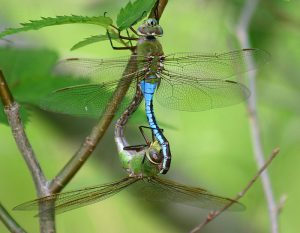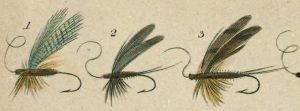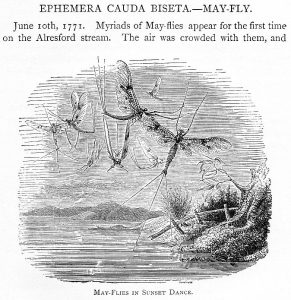by Gary Swick, FOFR President
Life is a process of transformations. All organisms go through stages that are ultimately driven by sex and conclude  in death. Understanding this can help us to cope with the events of our lives. Our lives, our endeavors, and the river, all have seasons. This is the season of new life for some, and an end of life for others.
in death. Understanding this can help us to cope with the events of our lives. Our lives, our endeavors, and the river, all have seasons. This is the season of new life for some, and an end of life for others.
This time of year is a very active time around many rivers. We humans take advantage of favorable weather and venture out to fish, paddle, cycle, and walk along the banks of the Fox River. Human activity is abuzz right now. This has impacts upon the local economies, our own spirits, and the harmony of the environment. We leave our winter caves and become people of the river.
But humans are not the only things buzzing with activity. Last month, I had the opportunity to watch two smallmouth bass build a nest, and perform a romantic dance before they got down to the business of perpetuating their species. Some of us have seen carp scurry through shallow areas and often startle paddlers. Of the millions of eggs they deposit, only a few hundred may survive for their own days of breeding to make more of their species.
The most recognized of riverine buzzers are the dragonflies. Like all insects, they have a lifecycle that has several distinct stage s. Aquatic species differ in the specifics of their lifecycles, but generally they follow the same pattern. The eggs are laid in water, and develop into a larval stage. There they spend the majority of their lives acting as voracious predators and providing food for larger organisms, All that feeding and growing is just to power and enable their sky dance as an adult. The larvae come to the surface in the summer and emerge into flying adults. As iridescent and acrobatic winged predators, they hook up in a “breeding wheel” (pictured) to fertilize the eggs of their next generation.
s. Aquatic species differ in the specifics of their lifecycles, but generally they follow the same pattern. The eggs are laid in water, and develop into a larval stage. There they spend the majority of their lives acting as voracious predators and providing food for larger organisms, All that feeding and growing is just to power and enable their sky dance as an adult. The larvae come to the surface in the summer and emerge into flying adults. As iridescent and acrobatic winged predators, they hook up in a “breeding wheel” (pictured) to fertilize the eggs of their next generation.
Many other winged adults have a similar life cycle. Among these are mayflies, craneflies, caddisflies, and stoneflies which are now visiting illuminated areas at night close to the river in June and early July. Mayflies in particular, can synchronize the emergence of trillions of adults into a single evening. The survivors, a week later, can be reduced to just thousands. My father told stories of shoveling pathways where exhausted mayflies covered the pavement a foot deep for blocks!
Just like warmer weather stimulates outdoor recreation near the river in humans, thes e events stimulate many species into action. Fish, and the anglers who pursue them, get active with their own predation during these hatches. This type of environmental stimulation pumps up the ecosystem’s energy economy, and I imagine the spirits of the insects, fish, and all others. I describe this stage of the cycle of life as the “River Prom”, the coming of age through a romantic dance.
e events stimulate many species into action. Fish, and the anglers who pursue them, get active with their own predation during these hatches. This type of environmental stimulation pumps up the ecosystem’s energy economy, and I imagine the spirits of the insects, fish, and all others. I describe this stage of the cycle of life as the “River Prom”, the coming of age through a romantic dance.
As humans and river people, it is important to appreciate the sometimes subtle, and sometimes obvious gifts that are always around us. One evening at the Dairy Queen in Dundee, I noticed folks swatting and cursing a swarm of caddisflies as they performed their dance. I tried to address their annoyance, and explain that tonight was prom night. I encouraged them to celebrate with them as it is their final dance.
us. One evening at the Dairy Queen in Dundee, I noticed folks swatting and cursing a swarm of caddisflies as they performed their dance. I tried to address their annoyance, and explain that tonight was prom night. I encouraged them to celebrate with them as it is their final dance.
The river and its inhabitants demonstrate that there are reasons for the seasons and cycles. For aquatic insects, it is a time of romance. Their dance ends in death, but only for that generation. The species, by design continues to thrive. I encourage all who are enjoying the summer along the Fox River to look for the life lessons the river, and the life that depends on it, presents to us all.

